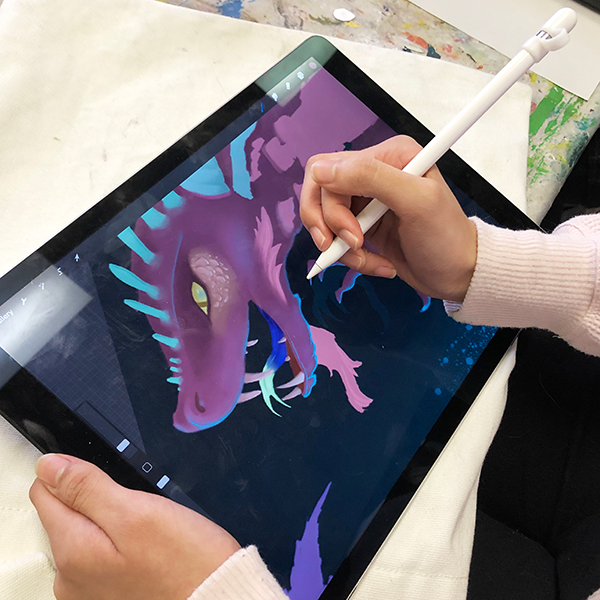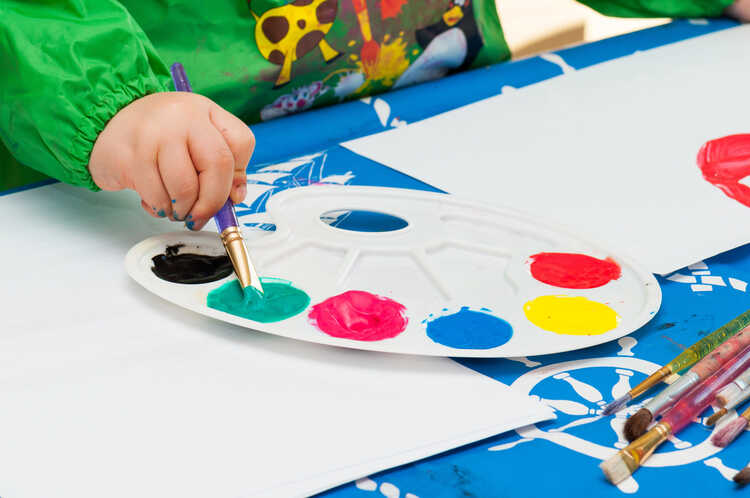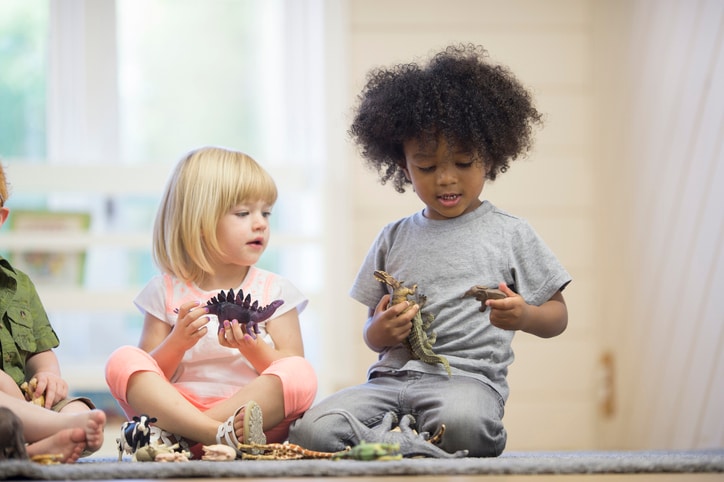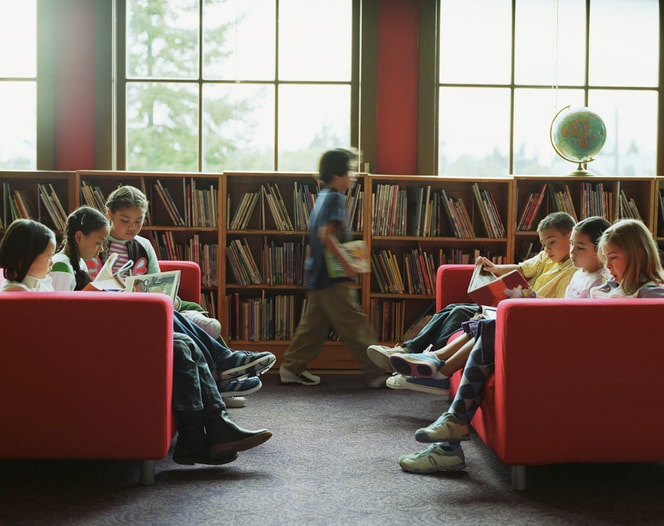Art Classes Near Me

Homeschool Art Exploration
100%
by Marvegos
San Mateo, CA
*Mid-session registration: If you are signing up AFTER THE FIRST DAY OF THIS SERIES OF 8 CLASSES, email info@marvegos.com about a possible project conflict before you arrive for class.* This is the same program that is offered later in the afternoon but at a discounted rate. Our school year curriculum for ages 4.5 to 7 includes a mix of works on paper and sculptures that offer a variety of media and opportunities to develop the student's understanding of basic concepts and terminology used in fine art making. This program does not require students to have prior art-making experience. If you are paying with funds from a Charter School, enter the promo code CharterPaysAll when you register and tell your ES to issue a purchase order for the class fee.
In-person
Ages 4-7 years

Homeschool Art Exploration
100%
by Marvegos
Los Gatos, CA
*Mid-session registration: If you are signing up AFTER THE FIRST DAY OF THIS SERIES OF 8 CLASSES, email info@marvegos.com about a possible project conflict before you arrive for class.* This is the same program that is offered later in the afternoon but at a discounted rate. Our school year curriculum for ages 4.5 to 7 includes a mix of works on paper and sculptures that offer a variety of media and opportunities to develop the student's understanding of basic concepts and terminology used in fine art making. This program does not require students to have prior art-making experience. If you are paying with funds from a Charter School, enter the promo code CharterPaysAll when you register and tell your ES to issue a purchase order for the class fee.
In-person
Ages 4-7 years

Homeschool Art Exploration
100%
by Marvegos
Los Gatos, CA
*Mid-session registration: If you are signing up AFTER THE FIRST DAY OF THIS SERIES OF 8 CLASSES, email info@marvegos.com about a possible project conflict before you arrive for class.* This is the same program that is offered later in the afternoon but at a discounted rate. Our school year curriculum for ages 4.5 to 7 includes a mix of works on paper and sculptures that offer a variety of media and opportunities to develop the student's understanding of basic concepts and terminology used in fine art making. This program does not require students to have prior art-making experience. If you are paying with funds from a Charter School, enter the promo code CharterPaysAll when you register and tell your ES to issue a purchase order for the class fee.
In-person
Ages 4-7 years

Homeschool Art Exploration
100%
by Marvegos
Los Gatos, CA
*Mid-session registration: If you are signing up AFTER THE FIRST DAY OF THIS SERIES OF 8 CLASSES, email info@marvegos.com about a possible project conflict before you arrive for class.* This is the same program that is offered later in the afternoon but at a discounted rate. Our school year curriculum for ages 4.5 to 7 includes a mix of works on paper and sculptures that offer a variety of media and opportunities to develop the student's understanding of basic concepts and terminology used in fine art making. This program does not require students to have prior art-making experience. If you are paying with funds from a Charter School, enter the promo code CharterPaysAll when you register and tell your ES to issue a purchase order for the class fee.
In-person
Ages 4-7 years

Homeschool Art Exploration
100%
by Marvegos
Los Gatos, CA
*Mid-session registration: If you are signing up AFTER THE FIRST DAY OF THIS SERIES OF 8 CLASSES, email info@marvegos.com about a possible project conflict before you arrive for class.* This is the same program that is offered later in the afternoon but at a discounted rate. Our school year curriculum for ages 4.5 to 7 includes a mix of works on paper and sculptures that offer a variety of media and opportunities to develop the student's understanding of basic concepts and terminology used in fine art making. This program does not require students to have prior art-making experience. If you are paying with funds from a Charter School, enter the promo code CharterPaysAll when you register and tell your ES to issue a purchase order for the class fee.
In-person
Ages 4-7 years

Beginner Art Lessons
100%
by The Giggling Pig - New Haven
New Haven, CT
May flowers are beginning to bloom, and so is our art this week at The Giggling Pig. Students will bring together a variety of mediums to create these gorgeous spring silhouettes. Expanding on concepts of form and composition, we will implement pattern and line to create variety with a single color.
In-person
Ages 4-6 years

Digital Art 2
100%
by Marvegos
San Mateo, CA
*Mid-session registration: If you are signing up AFTER THE FIRST DAY OF THIS SERIES OF 9 CLASSES, email info@marvegos.com about a possible project conflict before you arrive for class.* Digital Art 2 builds on students’ foundational Procreate skills and introduces them to a series of new digital art techniques. Each technique is taught through a focused lesson, followed by a project that allows students to practice and apply what they learned. Over the session, students will explore different approaches to digital drawing and painting while strengthening their skills, growing more confident, and working with greater independence. Individual guidance and feedback help students refine their ideas and create original artwork. What to Bring to Class: iPad (9th generation or newer recommended for best performance) Apple Pencil Charger Because this program is offered on a limited basis, make-up classes are not available. Please be sure your child can commit to the full 9-class series before registering.
In-person
Ages 12-17 years

Beginning Digital Art
100%
by Marvegos
San Mateo, CA
*Mid-session registration: If you are signing up AFTER THE FIRST DAY OF THIS SERIES OF 8 CLASSES, email info@marvegos.com about a possible project conflict before you arrive for class.* This digital art class introduces students to the fundamentals of drawing and painting using Procreate on their personal iPad. Through hands-on lessons, students will learn how to navigate the interface, use brushes and tools, and apply digital techniques to create original artworks. The course is designed to build a strong foundation for students interested in developing their digital art practice and a small class size means kids will get plenty of personalized instruction and one-on-one support. What to Bring to Class: iPad (9th generation or newer recommended for best performance) Apple Pencil Charger Because this program is offered on a limited basis, make-up classes are not available. Please be sure your child can commit to the full 9-class series before registering.
In-person
Ages 12-17 years

Art Camp + All-Sports Camp
99%
by GrowFit | San Jose
San Jose, CA
🎨✨ Unleash Creativity at GrowFit’s Art + All-Sports Camp! Calling all budding artists in grades 1–3! GrowFit’s Art + All-Sports Camp blends a morning of hands-on creativity with an afternoon of high-energy sports fun. Kids explore painting, sculpting, design, and mixed media—then switch gears after lunch for active games, teamwork, and movement! It’s the perfect full-day balance of imagination and play. ⭐ Why Choose GrowFit’s Art + All-Sports Camp? 🎨 Hands-On Art Adventures: Campers dive into painting vibrant masterpieces, creating leaf print art, sculpting with clay, designing mixed-media projects, and exploring new artistic tools. 🖌️ Creative Skill Building: Every day introduces new techniques, materials, and artistic challenges—all designed to build confidence and spark joy. 🤝 Collaborative Fun: Kids create alongside friends, share ideas, and celebrate each other’s unique work in a warm, supportive environment. 📈 Weeklong Creative Journey: Projects progress throughout the week, so drop-ins are not available. Full-week enrollment gives campers time to experiment, develop skills, and finish their masterpieces. Camp Details 🕘 Time: 9:00 AM – 4:00 PM (Full-Day Program) 🎨 Morning: Art Camp (9:00 AM – 12:00 PM) 🏅 Afternoon: All-Sports Camp (12:00 PM – 4:00 PM) 📍 Location: The Plex Drop-off: 8:45–9:00 AM at the BACK of The Plex. Pick-up: 3:30–4:00 PM at the BACK of The Plex. Early pick-ups are accepted at the same location. What to Bring: Comfortable clothing that can get messy Water bottle Two snacks Lunch With over a decade of experience offering enriching, joy-filled programs, GrowFit’s Art + All-Sports Camp gives young artists the chance to express themselves, explore new techniques, and take home creations they’ll be proud of—all while staying active and having fun. 🎨 Ready to Create, Play, and Imagine? Spots fill quickly—register today! Refunds and Cancellations 30+ days before camp: Full refund minus a 10% fee Within 30 days: Credit for future camp Day-of or after camp begins: Non-refundable
In-person
Ages 6-9 years

Homeschool Art Exploration
100%
by Marvegos
San Mateo, CA
*Mid-session registration: If you are signing up AFTER THE FIRST DAY OF THIS SERIES OF 8 CLASSES, email info@marvegos.com about a possible project conflict before you arrive for class.* This is the same program that is offered later in the afternoon but at a discounted rate. Our school year curriculum for ages 4.5 to 7 includes a mix of works on paper and sculptures that offer a variety of media and opportunities to develop the student's understanding of basic concepts and terminology used in fine art making. This program does not require students to have prior art-making experience. If you are paying with funds from a Charter School, enter the promo code CharterPaysAll when you register and tell your ES to issue a purchase order for the class fee.
In-person
Ages 4-7 years

Homeschool Art Exploration
100%
by Marvegos
Los Gatos, CA
*Mid-session registration: If you are signing up AFTER THE FIRST DAY OF THIS SERIES OF 8 CLASSES, email info@marvegos.com about a possible project conflict before you arrive for class.* This is the same program that is offered later in the afternoon but at a discounted rate. Our school year curriculum for ages 4.5 to 7 includes a mix of works on paper and sculptures that offer a variety of media and opportunities to develop the student's understanding of basic concepts and terminology used in fine art making. This program does not require students to have prior art-making experience. If you are paying with funds from a Charter School, enter the promo code CharterPaysAll when you register and tell your ES to issue a purchase order for the class fee.
In-person
Ages 4-7 years

Homeschool Art Exploration
100%
by Marvegos
Los Gatos, CA
*Mid-session registration: If you are signing up AFTER THE FIRST DAY OF THIS SERIES OF 8 CLASSES, email info@marvegos.com about a possible project conflict before you arrive for class.* This is the same program that is offered later in the afternoon but at a discounted rate. Our school year curriculum for ages 4.5 to 7 includes a mix of works on paper and sculptures that offer a variety of media and opportunities to develop the student's understanding of basic concepts and terminology used in fine art making. This program does not require students to have prior art-making experience. If you are paying with funds from a Charter School, enter the promo code CharterPaysAll when you register and tell your ES to issue a purchase order for the class fee.
In-person
Ages 4-7 years

Art club
100%
by The Giggling Pig - Trumbull
Trumbull, CT
The days may be getting shorter, but all that darkness just gives us an opportunity to celebrate light! No matter where you look at this magical time of year, you'll see a twinkle in the night, inspiring hope and joy. Our objective this week is to capture the essence of that glimmering shine in our art! With a limited palette and a focus on values students will mimic the flicker of light while practicing their blending techniques.
In-person
All ages

Art Camp + All-Sports Camp
99%
by GrowFit | San Jose
San Jose, CA
🎨✨ Unleash Creativity at GrowFit’s Art + All-Sports Camp! Calling all budding artists in grades 1–3! GrowFit’s Art + All-Sports Camp blends a morning of hands-on creativity with an afternoon of high-energy sports fun. Kids explore painting, sculpting, design, and mixed media—then switch gears after lunch for active games, teamwork, and movement! It’s the perfect full-day balance of imagination and play. ⭐ Why Choose GrowFit’s Art + All-Sports Camp? 🎨 Hands-On Art Adventures: Campers dive into painting vibrant masterpieces, creating leaf print art, sculpting with clay, designing mixed-media projects, and exploring new artistic tools. 🖌️ Creative Skill Building: Every day introduces new techniques, materials, and artistic challenges—all designed to build confidence and spark joy. 🤝 Collaborative Fun: Kids create alongside friends, share ideas, and celebrate each other’s unique work in a warm, supportive environment. 📈 Weeklong Creative Journey: Projects progress throughout the week, so drop-ins are not available. Full-week enrollment gives campers time to experiment, develop skills, and finish their masterpieces. Camp Details 🕘 Time: 9:00 AM – 4:00 PM (Full-Day Program) 🎨 Morning: Art Camp (9:00 AM – 12:00 PM) 🏅 Afternoon: All-Sports Camp (12:00 PM – 4:00 PM) 📍 Location: The Plex Drop-off: 8:45–9:00 AM at the BACK of The Plex. Pick-up: 3:30–4:00 PM at the BACK of The Plex. Early pick-ups are accepted at the same location. What to Bring: Comfortable clothing that can get messy Water bottle Two snacks Lunch (for full-day campers) With over a decade of experience offering enriching, joy-filled programs, GrowFit’s Art + All-Sports Camp gives young artists the chance to express themselves, explore new techniques, and take home creations they’ll be proud of—all while staying active and having fun. 🎨 Ready to Create, Play, and Imagine? Spots fill quickly—register today! Refunds and Cancellations 30+ days before camp: Full refund minus a 10% fee Within 30 days: Credit for future camp Day-of or after camp begins: Non-refundable
In-person
Ages 6-9 years

Beginning Digital Art
100%
by Marvegos
San Mateo, CA
*Mid-session registration: If you are signing up AFTER THE FIRST DAY OF THIS SERIES OF 9 CLASSES, email info@marvegos.com about a possible project conflict before you arrive for class.* This digital art class introduces students to the fundamentals of drawing and painting using Procreate on their personal iPad. Through hands-on lessons, students will learn how to navigate the interface, use brushes and tools, and apply digital techniques to create original artworks. The course is designed to build a strong foundation for students interested in developing their digital art practice and a small class size means kids will get plenty of personalized instruction and one-on-one support. What to Bring to Class: iPad (9th generation or newer recommended for best performance) Apple Pencil Charger Because this program is offered on a limited basis, make-up classes are not available. Please be sure your child can commit to the full 9-class series before registering.
In-person
Ages 12-17 years

Beginning Digital Art
100%
by Marvegos
San Mateo, CA
*Mid-session registration: If you are signing up AFTER THE FIRST DAY OF THIS SERIES OF 8 CLASSES, email info@marvegos.com about a possible project conflict before you arrive for class.* This digital art class introduces students to the fundamentals of drawing and painting using Procreate on their personal iPad. Through hands-on lessons, students will learn how to navigate the interface, use brushes and tools, and apply digital techniques to create original artworks. The course is designed to build a strong foundation for students interested in developing their digital art practice and a small class size means kids will get plenty of personalized instruction and one-on-one support. What to Bring to Class: iPad (9th generation or newer recommended for best performance) Apple Pencil Charger Because this program is offered on a limited basis, make-up classes are not available. Please be sure your child can commit to the full 9-class series before registering.
In-person
Ages 12-17 years

Digital Art 2
100%
by Marvegos
San Mateo, CA
*Mid-session registration: If you are signing up AFTER THE FIRST DAY OF THIS SERIES OF 8 CLASSES, email info@marvegos.com about a possible project conflict before you arrive for class.* Digital Art 2 builds on students’ foundational Procreate skills and introduces them to a series of new digital art techniques. Each technique is taught through a focused lesson, followed by a project that allows students to practice and apply what they learned. Over the session, students will explore different approaches to digital drawing and painting while strengthening their skills, growing more confident, and working with greater independence. Individual guidance and feedback help students refine their ideas and create original artwork. What to Bring to Class: iPad (9th generation or newer recommended for best performance) Apple Pencil Charger Because this program is offered on a limited basis, make-up classes are not available. Please be sure your child can commit to the full 9-class series before registering.
In-person
Ages 12-17 years

Kids Digital Art ages 8 - 11
by The Atelier School of Art
Sherwood, AR
The Kids' Digital Art class at The Atelier School of Art is a one-hour session designed for ages 8 and up, introducing young artists to the world of digital drawing and painting using iPads and Procreate. Students learn the fundamentals of layering, brush techniques, color theory, and composition, while exploring their creativity through fun and engaging projects. This class helps build technical skills and confidence in digital art, preparing students for more advanced techniques in the future.
In-person
Ages 8-11 years

HV Art PreSchool Ages 4-5
100%
by Art House
Flower Mound, TX
Spring Semester (Mid March-May) Exercise the imagination at the ART House. This class is designed for preschool children aged 4 and 5 to introduce them to art and proper classroom behavior. In this class they will work on fine motor skills through creating art! Your child will practice using scissors, holding a pencil and paint brush, and much more through drawing, painting, and sculpting. Classes are limited in sizes so sign your child up today!
In-person
Ages 4-5 years

Gymboree at the JCC: Family Art
99%
by Gymboree Play & Music, Carmel
Indianapolis, IN
Discover varying media, textures, artistic techniques and more alongside your little one in our process-oriented exploration of visual crafting: Family Art! Family Art is for children ages 16 months to 6 years with a caregiver.
In-person
Ages 1-6 years

Advanced Art: Pop Art Flowers
100%
by The Giggling Pig - Milford
Milford, CT
Pop Art roots itself in the representation of everyday elements and objects popular in mass culture. It favors bold colors that are taken out of context with playful imagery. The perfect style to interpret the popular month of May subject…..FLOWERS . This weekly 2-hour class is a great option for kids looking to move ahead with their artistic talents. The students are given more independence and freedom to be creative with the projects, and they have more autonomy in how their projects go. Projects often run for 3-4 weeks to give students the extra time to create a really impressive piece. Recommended for ages 9-16. Dress for a mess! We often work with acrylic paints and oil pastels, which can be very difficult to remove from clothing.
In-person
Ages 9-16 years
Showing 85 - 105 of 486









